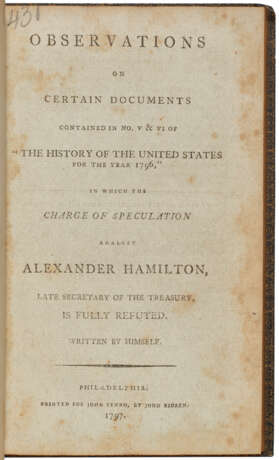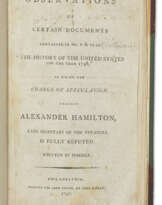ID 1236376
Lot 145 | Admitting an extramarital affair with Maria Reynolds
Estimate value
$ 8 000 – 12 000
First edition of the notorious "Reynolds pamphlet" in which Hamilton reveals: "The charge against me is a connection with one James Reynolds for purposes of improper pecuniary speculation. My real crime is an amorous connection with his wife..." (p. 9). In 1791 Hamilton was approached by Maria Reynolds who claimed her husband had abandoned her and sought financial assistance. The pair began an illicit affair that lasted until the summer of 1792. However, Maria's husband, James was fully aware of the affair and began to use it as a means to blackmail Hamilton believing that the Secretary of the Treasury would admit to financial improprieties before revealing an extramarital affair. Reynolds revealed his accusations to James Madison, who concluded that the charges were false and assured Hamilton that he would not reveal the charge of adultery. However, Madison made the mistake of sending the information to Hamilton's nemesis, Thomas Jefferson, who used the information to spread rumors about Hamilton's private life. Those rumors finally burst into the open in the summer of 1797 with the publication of James Thomas Callender's History of the United States, in which he revealed the affair. Jefferson, who would later condemn Callender as a "poor creature," and as "drunken, penniless and unprincipled," sought out the author in July 1797, eager to purchase copies of his History, and, at the time, wrote of him as a "man of genius." (See Chernow, p. 530). To defend against the charges, Hamilton set to work on the present pamphlet, in which he exposed Reynolds's blackmail, while revealing the affair in the process (although he apologizes for the impropriety). Scandalized by the frankness of the work, Hamilton's family attempted to suppress it, thus making the present edition quite rare. Hamilton's adversaries at the Aurora reprinted it in 1800. Evans 32222; Ford, Bibliotheca Hamiltoniana 64; Howes H-120; Sabin 29969.
Small quarto, 196 x 118mm. (Light foxing to title page, and occasional foxing to later pages). Later gilt-stamped black morocco boards. Provenance: Edward Delafield Smith (1826-1878) United States Attorney for the Southern District of New York during the Administration of Abraham Lincoln (ownership inscription on blank leaf).
| Artist: | Alexander Hamilton (1755 - 1804) |
|---|---|
| Place of origin: | USA |
| Auction house category: | Books |
| Artist: | Alexander Hamilton (1755 - 1804) |
|---|---|
| Place of origin: | USA |
| Auction house category: | Books |
| Address of auction |
CHRISTIE'S 8 King Street, St. James's SW1Y 6QT London United Kingdom | |
|---|---|---|
| Preview |
| |
| Phone | +44 (0)20 7839 9060 | |
| Buyer Premium | see on Website | |
| Conditions of purchase | Conditions of purchase |









